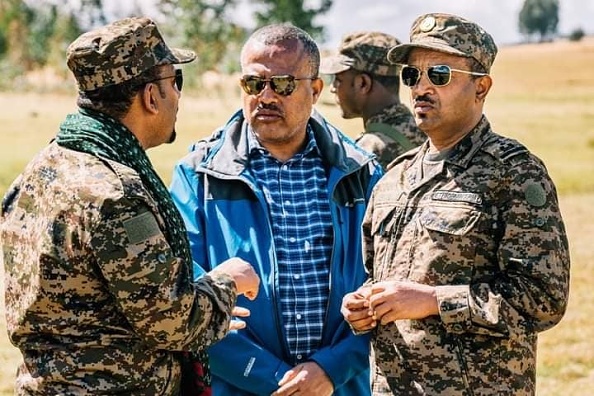Addis Ababa – Ethiopia’s government said on Monday it had recaptured two strategic towns from rebel fighters, the latest in a rapid series of battlefield victories claimed by forces loyal to Prime Minister Abiy Ahmed.
The announcement marks another dramatic twist in the 13-month-old conflict that has killed thousands of people and triggered a deep humanitarian crisis in the north of Africa’s second most populous nation.
The government’s communications service said on Twitter that Dessie and Kombolcha had been “freed by the joint gallant security forces” that had also taken control of several other towns on the eastern front.
The two cities, which lie in the Amhara region on a highway about 400 kilometres (250 miles) by road northeast of the capital Addis Ababa, were reportedly taken by the Tigray People’s Liberation Front (TPLF) at the end of October.
Their capture had sparked fears that the TPLF and its ally, the Oromo Liberation Army, would march on the capital, leading alarmed foreign governments to urge their citizens to leave the country as soon as possible.
ALSO READ | Ethiopia’s war in uncertain phase after Abiy’s advance
The state-run Ethiopian Broadcasting Corporation quoted Abiy as saying the rebels had sustained “heavy losses and (were) unable to cope with the strike by allied forces”.
“The enemy will be hit and the victory will continue,” he said.
Abiy – who won the Nobel Peace Prize two years ago – announced last month he would head to the battlefront following a series of advances claimed by the rebels, as fighting reportedly raged on at least three fronts.
And over several days last week, the government said the military and its allies had retaken the Unesco World Heritage site of Lalibela, which had fallen to TPLF fighters in August, as well as the town of Shewa Robit which lies only 220 kilometres from Addis Ababa by road.
TPLF spokesman Getachew Reda said on Twitter late Monday that rebel forces had left towns including Kombolcha and Dessie “as part of our plan”.
On Sunday, TPLF leader Debretsion Gebremichael had denied the government was scoring major victories, saying the rebels were making strategic territorial adjustments and remained undefeated.
“The enemy is getting stronger so we also have to be strong and intensify our struggle,” he said.
Shock comeback
The government declared a nationwide state of emergency in early November after the TPLF fighters claimed the capture of Dessie and Kombolcha as they advanced towards the capital.
But Abiy’s administration described the gains by the TPLF as overstated and insisted that the city of more than five million people was secure.
Much of northern Ethiopia is under a communications blackout and access for journalists is restricted, making battlefield claims difficult to independently verify.
The war broke out in November 2020 when Abiy sent troops into Ethiopia’s northernmost region of Tigray to topple the TPLF after months of seething tensions with the group that had dominated politics for three decades before he took office.
ALSO READ | Ethiopia govt claims to retake Unesco site Lalibela from rebels
He said the move was in response to attacks on army camps by the TPLF, and vowed a swift victory.
But the rebels mounted a shock comeback, recapturing most of Tigray by June before advancing into the neighbouring regions of Amhara and Afar.
The fighting has displaced more than two million and driven hundreds of thousands into famine-like conditions, according to UN estimates, with reports of massacres and mass rapes by both sides.
But intense diplomatic efforts led by the African Union to try to reach a ceasefire have failed to achieve any visible breakthrough.
Risk of ‘fracture’
Last week, the UN undersecretary for humanitarian affairs, Martin Griffiths, warned that Ethiopia risked descending into sectarian violence that could “fracture” the country if the conflict spread to Addis Ababa.
Earlier Monday, the United States and Western allies sounded the alarm over reports the Ethiopian government has unlawfully detained large numbers of citizens on ethnic grounds and called for the arrests to “cease immediately”.
“Many of these acts likely constitute violations of international law,” Australia, Canada, Denmark, the Netherlands and Britain, along with the US, said in a statement.
“Individuals are being arrested and detained without charges or a court hearing and are reportedly being held in inhumane conditions.”
The statement cited reports by the Ethiopian Human Rights Commission and Amnesty International, which “describe widespread arrests of ethnic Tigrayans,” including the elderly and young children.
Follow African Insider on Facebook, Twitter and Instagram
Source: AFP
Picture: Getty Images
For more African news, visit Africaninsider.com


